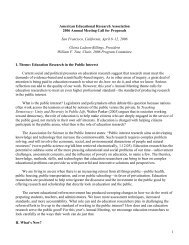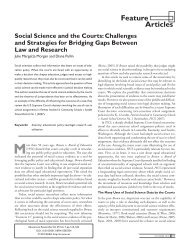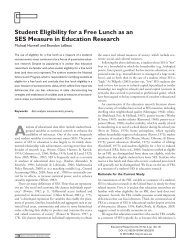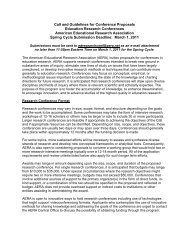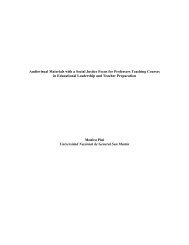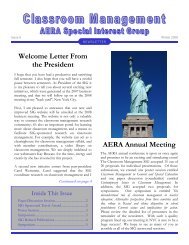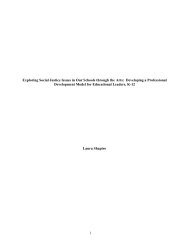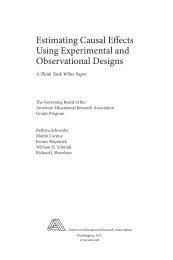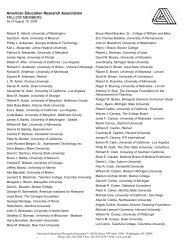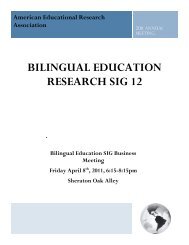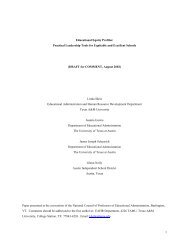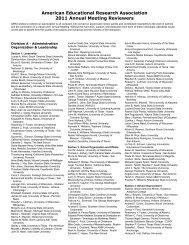Summer
Summer
Summer
You also want an ePaper? Increase the reach of your titles
YUMPU automatically turns print PDFs into web optimized ePapers that Google loves.
PEACE EDUCATION<br />
A Special Interest Group of The<br />
American Educational Research Association<br />
NEWSLETTER<br />
SUMMER, 2006<br />
Vol. 9 No. 2<br />
Jing Lin, University of Maryland<br />
Online Newsletter Editor and<br />
Irene Zoppi, Associate Editor<br />
Reminder: Website for the Online Newsletter is at the AERA Website<br />
(www.AERA.net). Go to section on SIGs. Find Peace Education SIG. Click on<br />
<strong>Summer</strong> 2006 Newsletter<br />
CONTENTS:<br />
• Message from the SIG Chair, Rosemarie Stallworth-Clark<br />
• Notes from SIG Annual Board Meeting: April 8, 2006<br />
• SIG leadership<br />
• Invitation to submit proposal for 2007!<br />
• Biography of Leaders in Peace Education<br />
• Peace Education Resources<br />
• Upcoming Events and Conferences<br />
• AERA Peace Education SIG Program in 2006<br />
• Reflection from a Canadian Peace Education Leader<br />
• Note from Editor
_____________________________________________________________<br />
MESSAGE FROM THE SIG CHAIR,<br />
ROSEMARIE STALLWORTH-CLARK<br />
A Message to Peace Education SIG Members,<br />
On behalf of myself and the other newly elected members of the Peace Education SIG<br />
Executive Board, we wish to thank you for your confidence in us and for your<br />
continued support for the work of peace education. It is with great pleasure, yet<br />
substantial trepidation, that I assume the office of Chair of the American Educational<br />
Research Association’s Peace Education Special Interest Group. As we begin to plan<br />
for next year’s program to be held in Chicago, Illinois, USA, Monday, April 9 --<br />
Friday, April 13, 2007, I am very aware that the rewarding work of Chair is only<br />
possible through the strong assistance of our membership. Thank you, in advance for<br />
your active participation and commitment to the work of the SIG during the coming<br />
year.<br />
Accessible at www.aera.net., the following activities and roles are critically<br />
important calls for your participation and support—beginning as early as June 2,<br />
2006: ( 1) Submit paper proposals to our Peace Education SIG for next year’s<br />
conference in Chicago. The submission period begins June 2, 2006, and ends August<br />
2, 2006, 11:59pm Pacific Standard Time. Late submissions will not accepted so don’t<br />
be late. Paper proposal submissions are especially important because the number of<br />
presentation sessions provided for our SIG will be based on the number of proposals<br />
we receive through the AERA Proposal Online System—accessible at www. aera.net.<br />
(2) Volunteer to be a reviewer of proposals; (3) Volunteer to be a discussant of<br />
three to four papers presented at a single paper session; (3) Volunteer to chair a<br />
paper session.<br />
For the purpose of increasing awareness of the innumerable ways and means by<br />
which we and others do the work for peace beyond the annual meeting, an incomplete,<br />
yet comprehensive listing of resources for peace education is included in this<br />
newsletter. We invite you to tell us more about your work for peace. Please help us<br />
add to our peace education resources list by sending information to our On-line News<br />
Editor: Jing Lin (jinglin@umd.edu)--( University of Maryland). As you write and<br />
present; develop resources for peace education; know of conferences and/or other<br />
future special events for peace, please send details to Jing Lin so that she can include
current news and events in future newsletters.<br />
In our next newsletter, we will feature biographical sketches of our Peace Education<br />
SIG Leadership. As you read and enjoy the letter, please share it with others as we<br />
share the call to peace on this planet we call earth- in our schools, homes,<br />
communities, and nations, in every way, in every place, in every circumstance, in all.<br />
For PEACE,<br />
Rosemarie Stallworth- Clark, Chair<br />
AERA Peace Education SIG<br />
_____________________________________________________________<br />
NOTES FROM SIG ANNUAL BOARD<br />
MEETING: APRIL 8, 2006<br />
* Open Forum presentation and discussion: Thanks to Dr. Mark Malaby for presenting his<br />
research on masculinity and violence, and to Candice Carter as discussant, for the excellent<br />
Open Forum (first hour of meeting). Thanks, also, to all SIG paper presenters, proposers,<br />
reviewers, discussants and chairs at this year’s conference.<br />
*THANKS: to 2005-06 SIG leaders (completing terms and continuing):<br />
SIG Chair (1 year term ends 4/2006) Kathy Bickmore; Program Chair (2 year term ends<br />
4/2006) Rosemarie Stallworth-Clark; Vice Chair 2005-06 (to become Program Chair for<br />
2006-08) Olga Jarrett; Secretary/Treasurer (term ends 4/ 2006) Marty Khan; Newsletter<br />
Editor (10-year! term ended 2006) Aline Stomfay-Stitz; Board Members at Large (2 year<br />
term ends 4/2006) Bill Timpson and Tom Cavanagh; Board Member at Large (2 year term<br />
ends 4/2007) Candice Carter; Past Chair Edyth Wheeler; Previous Past Chair/Advisor Blythe<br />
Hinitz.<br />
*More thanks: Members present offered PARTICULARLY ENTHUSIASTIC THANKS to<br />
Program Chair 2005 & 2006 Rosemarie Stallworth-Clark, AND to retiring, long-serving and<br />
innovative Newsletter Editor ‘Extraordinaire,’ Aline Stomfay-Stitz!<br />
* SIG Steering Committee (Board) LEADERSHIP for 2006-07
Selected by acclamation/ consensus by those present at this Annual Meeting<br />
* SIG board size: As the above list suggests, members present agreed to a slightly-expanded<br />
steering committee (SIG board), for this year, in order to include all who expressed interest<br />
in such involvement. All of the above leadership roles/terms are renewable (except that<br />
normally Past Chair rotates off, Chair becomes Past Chair, Program Chair becomes Chair,<br />
and Vice Chair becomes Program Chair).<br />
* New electronic journal: Candice Carter described and distributed information about her<br />
new, open-access electronic journal, inviting SIG members to participate (for information:<br />
ccarter@unf.edu)<br />
* SIG newsletter wishes brainstorm (input for new Editor): Members present are enthusiastic<br />
about having a SIG newsletter continue, although some SIG communication functions (such<br />
as Chair and Program Chair sending out invitations to participate and program schedules) are<br />
now covered by AERA’s new e-list provision. Some people suggested that this newsletter be<br />
small-scale and stick primarily to SIG business, while others also hoped for additional short<br />
items such as reports on papers presented (and how to get copies) and mini-reviews of new<br />
resources.<br />
______________________________________________________________________<br />
SIG LEADERSHIP 2006-2007<br />
-SIG Chair: Rosemarie Stallworth-Clark (rosemari@georgiasouthern.edu) term ending<br />
4/2007<br />
-Program Chair: Olga Jarrett (ojarrett@mindspring.com), term ending 4/2007 (should<br />
become SIG Chair, following year, 2007-08)<br />
-Vice Chair: Bill Timpson (wtimpson@lamar.colostate.edu), term ending 4/2007 (would<br />
become Program Chair, following year, 2007-08)<br />
-Treasurer: Candice Carter (ccarter@unf.edu), 2-year term ending 4/2008<br />
-On-line News Editor: Jing Lin (jinglin@umd.edu), assisted by her colleague, Dr. Irene<br />
Zoppi (also at the Univ. of Maryland) as Associate Editor, 2-year term ending 4/2008<br />
-Past Chair: Kathy Bickmore (kbickmore@oise.utoronto.ca), 1-year term ending 4/2007<br />
-Board Member at Large (continuing, also advisor to the new Secretary-Treasurer): Marty<br />
Khan (mkhan@unf.edu), term ending 4/2007<br />
-Board Member at Large (continuing): Tom Cavanagh (new email!<br />
cavanagh@waikato.ac.nz), term ending 4/2007
-Board Member at Large (new, completing Candice’s 2-year term): Tania Ramalho<br />
(ramalho@oswego.edu), term ending 4/2007<br />
-Board Member at Large (new): Linda Pickett (lpickett@umflint.edu), 2-year term ending<br />
4/2008<br />
-Board Member at Large (new): Claire McGlynn (c.mcglynn@qub.ac.uk), 2-year term<br />
ending 4/2008<br />
-Board Member at Large (new): Elavie Ndura (endura@gmu.edu), 2-year term ending<br />
4/2008<br />
--Board Member at Large (new): Shani Beth-Halachmy (sbeth@nl.edu), 2-year term ending<br />
4/2008<br />
-Advisors/ elders (previous past chairs, not on Board, but available for consultation as<br />
needed): "Stomfay-Stitz, Aline" ASTOMFAY@unf.edu, Edyth Wheeler,<br />
ejwheel@towson.edu, and Blythe Hinitz hinitz@tcnj.edu<br />
_______________________________________________________________________<br />
INVITATION TO SUBMIT PROPOSALS FOR 2007!<br />
SIG Program Chair Olga Jarrett encourages our members to submit paper proposals, and to<br />
reach out to others to solicit paper proposals, by end of July for next year’s conference in<br />
Chicago. This is especially important now because SIG session allocation will be based on<br />
number of proposals submitted (more than on number of members, as was the case in the<br />
past). Olga also asks members to volunteer as proposal reviewers (for this summer/ early<br />
fall), and as discussants and chairs (at next year’s conference). Note that participation in all<br />
of these roles requires logging on to www.aera.net and volunteering for each applicable role<br />
for this SIG (volunteers set the maximum numbers of proposals they are willing to review,<br />
etc, for each SIG or division).
____________________________________________________________<br />
BOOKS<br />
PEACE EDUCATION RESOURCES<br />
Love, Peace, and Wisdom in Education: A Vision for Education in the 21st Century<br />
By Jing Lin, Rowman and Littlefield Education<br />
Author Jing Lin contends that there is a great need for educators to reconceptualize education in<br />
the 21st century. Here, she discusses the danger of global wars, environmental<br />
breakdown, moral vacuum and nihilism in society, and the problems in current<br />
debates on school reform. This book calls for a school that facilitates the<br />
formation of a compassionate and loving global community-one that teaches the<br />
younger generation to gain a harmonious, respectful relationship with nature. The<br />
author envisions a school where the teaching of our interconnectedness based<br />
on love, changes the learning atmosphere, school curriculum focus, teacher-<br />
student relationships, school leadership, and the role of education in society as a<br />
transformative power. The book challenges our schools to shift from a<br />
rationalistic, functionalist perspective that primarily emphasizes tests and<br />
efficiency, to a constructive, transformative paradigm in which the integrated development of<br />
students' intellectual, moral, emotional, spiritual, and ecological abilities to promote understanding<br />
of the world helps nurture respect for all human beings and nature. In all, constructing a loving<br />
world should be the central purpose of education in the 21st century. Website:<br />
http://www.rowmaneducation.com/Catalog/SingleBook.shtml?command=Search&db=^DB/CATAL<br />
OG.db&eqSKUdata=1578863341.<br />
This book will be of interest to policy makers, teachers, school administrators, peace and<br />
environmental activists, and students.<br />
Finding Forgiveness, written by Eileen Borris, Past President Division 48 of the Society<br />
for the Study of Peace Conflict and Violence of the American Psychological Association, and<br />
current Director of Training - The Institute for Multi-Track Diplomacy, Washington<br />
DC, will be published by McGraw-Hill in early September.<br />
Finding Forgiveness lays out the framework which underlies our thinking that inhibits us<br />
from being able to forgive. Then it shows the reader how to transform one’s thinking to not<br />
only be able to forgive but to be more compassionate and loving human beings. This book<br />
shows how an inner transformation can lead to societal change. Included in this book are
inspiring stories of incredible individuals from the person who could be your next door<br />
neighbor to one of the holiest men in the world, His Holiness the Dalai Lama. Each of the<br />
story tellers shares their struggles and eventual triumphs in being able to forgive.<br />
Finding Forgiveness also grapples with the harder issues that societies and the world at large<br />
needs to think about if we want to survive as a human race. It asks us difficult questions such<br />
as can we forgive something as horrific as 9/11 and other terrorist attacks? Is it possible to<br />
use forgiveness as a process for global societal change? Can forgiveness unite us and heal<br />
our wounds so as one humanity we can move forward together in peace and prosperity?<br />
The Book of Secrets: Unlocking the hidden dimensions of your life, By Deepak<br />
Chopra. ISBN 1-4000-9834-3. Published by Three Rivers Press, 2004. Every life is a book<br />
of secrets, ready to be opened. The secret of perfect love is found there, along with the<br />
secrets of healing, compassion, faith, and the most elusive one of all: who we really are. We<br />
are still mysteries to ourselves, despite the proximity of these answers, and what we most<br />
long to know remains lodged deep inside. We all want to know how to find a soul mate,<br />
what career would be most fulfilling, how to live a life with meaning, and how to teach our<br />
children well. We are looking for a personal breakthrough, a turning point, a revelation that<br />
brings with it new meaning. The Book of Secrets--a crystalline distillation of insights and<br />
wisdom accumulated over the lifetime of one of the great spiritual thinkers of our time-provides<br />
an exquisite new tool for achieving just that. Because answers to the questions at<br />
the center of life are counterintuitive, they are often hidden from view, sequestered from our<br />
everyday gaze. In his ongoing quest to elevate our experience, bestselling author Deepak<br />
Chopra has isolated fifteen secrets that drive the narrative of this inspiring book--and of our<br />
lives. From "The World Is in You" and "What You Seek, You Already Are" to "Evil Is Not<br />
Your Enemy" and "You Are Truly Free When You Are Not a Person," The Book of Secrets is<br />
rich with insights, a priceless treasure that can transport us beyond change to transformation,<br />
and from there to a sacred place where we can savor the nectar of enlightenment. "The Book<br />
of Secrets is the finest and most profound of Deepak Chopra’s books to date. Want the<br />
answers to the secrets of life? Let me recommend that you start right here." -- Ken Wilber,<br />
author of A Brief History of Everything. http://www.peace..ca/bookofsecrets.htm<br />
“The Breakthrough Experience: A Revolutionary New Approach to Personal<br />
Transformation” by Dr, John F. Demartini. ISBN 1-56170-885-2. Published By Hay<br />
House Inc. May 2002. 263 pages. This book is an extremely real and practical manual for<br />
understanding why we live the way we do, and how to transform our lives into our highest<br />
vision. You will learn a formula to manifest your dreams, discover the secrets of opening<br />
your heart beyond anything you have imagined, find out how to increase love and<br />
appreciation for every aspect of your life, receive profound insights on how to create more<br />
fulfilling and caring relationships, reawaken your birthright as a true genius, transcend the<br />
fears and illusions surrounding the myth of death, and reconnect with your true mission and<br />
purpose on Earth. That is all true, but mainly, this book will deeply touch and inspire you<br />
with respect to your own greatness and potential—and the magnificence of every single<br />
human soul. This is not just a book, it is what the title implies—an Experience—and it is<br />
impossible to go through it without being moved, challenged, and changed.<br />
http://www.peace.ca/breakthroughexperience.htm
“The Seven Spiritual Laws of Success: A practical guide to the fulfillment of your<br />
dreams.” by Deepak Chopra. ISBN 1-878424-11-4. Published by Amber-Allen Publishing<br />
& New World Library 1994. 112 pages. This is a book you will cherish for a lifetime, for<br />
within its pages are the secrets to making all your dreams come true. Deepak Chopra distills<br />
the essence of his teachings into seven simple yet powerful principles that can easily be<br />
applied to create success in all areas of your life. Based on natural laws which govern all of<br />
creation, this book shatters the myth that success is the result of hardwork, exacting plans, or<br />
driving ambition. Deepak Chopra offers a life-altering perspective on the attainment of<br />
success: Once we understand our true nature & learn to live in harmony with natural law, a<br />
sense of well-being, good health, fulfilling relationships, energy & enthusiasm for life &<br />
material abundance will spring forth easily & effortlessly. Filled with timeless wisdom &<br />
practical steps you can apply right away, this is a book you will want to read & refer to again<br />
& again. http://www.peace.ca/spirituallaws.htm<br />
I Need Your Love: Is that true?: The Search For Love, Approval, And Happiness, By<br />
Byron Katie. ISBN 1-4000-5107-X. Published by Harmony Books. - In Loving What Is,<br />
bestselling author Byron Katie introduced thousands of people to her simple and profound<br />
method of finding happiness through questioning the mind. Now, I Need Your Love—Is That<br />
True? examines a universal, age-old source of anxiety: our relationships with others. In this<br />
groundbreaking book, Katie helps you question everything you have been taught to do to<br />
gain love and approval. In doing this, you discover how to find genuine love and<br />
connection. The usual advice offered in self-help books and reinforced by our culture<br />
advocates a stressful, all-consuming quest for love and approval. We are advised to learn<br />
self-marketing and manipulative skills—how to attract, impress, seduce, and often pretend to<br />
be something we aren’t. This approach doesn’t work. It leaves millions of walking<br />
wounded—those who, having failed to find love or appreciation, blame themselves and<br />
conclude that they are unworthy of love. I Need Your Love—Is That True? helps you<br />
illuminate every area in your life where you seem to lack what you long for most—the love<br />
of your spouse, the respect of your child, a lover’s tenderness, or the esteem of your boss.<br />
Through its penetrating inquiry, you will quickly discover the falseness of the accepted ways<br />
of seeking love and approval, and also of the mythology that equates love with need. Using<br />
the method in this book, you will inquire into painful beliefs that you’ve based your whole<br />
life on—and be delighted to see them evaporate. Katie shows you how unraveling the knots<br />
in the search for love, approval, and appreciation brings real love and puts you in charge of<br />
your own happiness. “Everyone agrees that love is wonderful, except when it’s terrible.<br />
People spend their whole lives tantalized by love—seeking it, trying to hold on to it, or trying<br />
to get over it. Not far behind love, as major preoccupations, come approval and appreciation.<br />
>From childhood on, most people spend much of their energy in a relentless pursuit of these<br />
things, trying out different methods to be noticed, to please, to impress, and to win other<br />
people’s love, thinking that’s just the way life is. This effort can become so constant and<br />
unquestioned that we barely notice it anymore. This book takes a close look at what works<br />
and what doesn’t in the quest for love and approval. It will help you find a way to be happier<br />
in love and more effective in all your relationships. What you learn here will bring<br />
fulfillment to all kinds of relationships, including romantic love, dating, marriage, work, and<br />
friendship.” —Byron Katie. http://www.peace.ca/isthattrue.htm
The Greatest Miracle in the World, By Og Mandino. ISBN 0-553-34157-X. Published by<br />
Bantam Books, 1975 - this entertaining little book describes the four laws of happiness and<br />
success:<br />
• Count your blessings<br />
• Proclaim your rarity<br />
• Go another mile<br />
• Use wisely your power of choice<br />
• And one more, to fulfill the other four. Do all things with love…love for yourself,<br />
love for all others, and love for G.O.D. (“Grand Organizational Design/Designer”).<br />
"Plan B 2.0, Rescuing a Planet Under Stress and a Civilization in Trouble" by Lester R.<br />
Brown, 2006; Earth Policy Institute, W. W. Norton & company, New York. You can also<br />
download the chapters free from: http://www.earth-policy.org/Books/PB2/Contents.htm<br />
Transformative Practice: New Paths to Leadership,(add publisher and publication date)<br />
by Dr. Sue McGregor, makes the argument that individuals, organizations, and entire<br />
professions must evolve and adapt if they are to effectively serve humanity and the common<br />
good within an increasingly imbalanced and volatile global environment. To achieve this<br />
evolution, transformative professionals are tasked with creating nothing less than a profound<br />
paradigm shift within their own practice and among the wider community that will extend<br />
outward to positively impact all of human society on many levels. This new, transformative<br />
style of leadership will require change in pedagogy and professional development. Evidence<br />
will manifest itself through education at all levels, in refocused policy involvement, in new<br />
approaches to private and public enterprise, in civil society involvement, and in personal<br />
growth and reflection. McGregor’s innovative, ambitious focus centers around the five<br />
themes of paradigm shifts, leadership, educational pedagogy, philosophical growth, and<br />
globalization. The resulting vision calls for a new, globally responsive model of professional<br />
practice that is dynamic and evolving, full of rich, reflective communication, replete with<br />
innovative practice, and guided by clear, far reaching<br />
goals. http://www.consultmcgregor.com/<br />
"Boys of Few Words: Raising Our Sons to Communicate and Connect" by Adam Cox,<br />
PhD (Guilford 2006), about the social and emotional development of boys, in your<br />
community. We need to raise this generation of boys to become socially conscious, empathic<br />
readers. Mary Pipher, PhD, says this "book is important, insightful, and timely. His [Dr.<br />
Cox's] ideas about helping boys of all ages will be useful to parent, to teachers, and indeed to<br />
all of us who have a stake in boys' emotional health--which is, in fact, everyone." For more<br />
information, you can check out the author's website at: www.dradamcox.com<br />
ONLINE SOURCES<br />
Philosophers for Peace has been completed at: http://peacephilosophy.org
Mahatma Gandhi News Digest, May 15-21, 2006. Select News on Mahatma Gandhi,<br />
Peace and Nonviolence: http://www.gandhiserve.org/news/news.html<br />
The Special Issue of the PEACE REVIEW (published by Taylor and Francis) is<br />
now available. Based on over 150 proposals received, eleven articles were<br />
accepted for publication. These essays represent the cutting edge of<br />
contemporary thought on the psychology of warfare. A LIMITED NUMBER OF<br />
COPIES OF THIS SPECIAL ISSUE NOW ARE AVAILABLE<br />
For information on how to obtain a copy of the Special<br />
Issue on the PSYCHOLOGICAL INTERPRETATION OF WAR, please<br />
CLICK HERE: https://www.ideologiesofwar.com/register/<br />
Articles included in this special issue are listed below. We also have<br />
provided below brief excerpts that convey the excitement of this special<br />
issue.<br />
Articles include:<br />
SACRIFICE, TRANSCENDENCE AND THE SOLDIER, Babak Rahimi, Assistant<br />
Professor of Iranian and Islamic Studies at the University of California at San Diego.<br />
GROUP PSYCHOLOGY, SACRIFICE AND WAR, Norman Steinhart, M.D., Research<br />
Fellow at the McLuhan Program in Culture and Technology at the University of<br />
Toronto, Canada<br />
WAR AND THE RELIGIOUS WILL TO SACRIFICE, Patrick Porter, Tutor in Modern<br />
History at the University of Oxford<br />
MEMORIALIZATION AND THE SELLING OF WAR, Deborah D. Buffton, Professor of<br />
History at the University of Wisconsin, La Crosse<br />
THE MYTHOLOGY OF WAR, Dr. Andrew Robinson, Political theorist, University of<br />
Nottingham<br />
THE MANIC ECSTASY OF WAR, Wendy C. Hamblet, Professor of Philosophy, Adelphi<br />
University, New York<br />
HUMILIATION AND THE GLOBAL WAR ON TERROR, Paul Saurette, Assistant<br />
Professor, School of Political Studies at the University of Ottawa, Canada<br />
DOMINANCE AND SUBMISSION IN POSTMODERN WAR IMAGERY, Myra Mendible,<br />
Associate Professor of American Studies at Florida Gulf Coast University<br />
GUILT AND SACRIFICE IN U.S. WARFARE, Carl Mirra, American Studies at SUNY
College, Old Westbury<br />
MALE GENDER INSTABILITY AND WAR, Jeannette Marie Mageo, Professor of<br />
Anthropology, Washington State University<br />
COMBAT MOTIVATION, Johan M.G. van der Dennen, senior researcher on war and<br />
peace at the University of Groningen, the Netherlands<br />
For information on how to obtain a copy of the Special<br />
Issue on the PSYCHOLOGICAL INTERPRETATION OF WAR on:<br />
https://www.ideologiesofwar.com/register/<br />
For further information please contact Orion Anderson at (718) 393-1104 or<br />
send an email to oanderson@ideologiesofwar.com<br />
________________________________________________________________________<br />
UPCOMING EVENTS/CONFERENCES<br />
PEACE EDUCATION CENTER, TEACHERS COLLEGE, COLUMBIA<br />
UNIVERSITY<br />
Educating for Global Peace<br />
spiritual & ethical perspectives on peace & justice<br />
A PEACE EDUCATION CENTER & BIOSOPHICAL INSTITUTE SPONSORED LECTURE SERIES<br />
JUNE - DECEMBER 2006<br />
WWW.TC.EDU/PEACEED/SPIRITETHIC<br />
In an age of unprecedented, ubiquitous and seemingly unending violence, people throughout<br />
the world have lost trust in the institutions, leaders, and policies that determine their lives.<br />
Some join together in alternative political movements and some engage in violent resistance,<br />
such as that which caused and is exploited by the war on terror. Yet the vast majorities are<br />
paralyzed in the face of the global crisis of violence, lacking the critical skills, knowledge<br />
and the capacities to bring forth alternatives to confront it and engage in a democratic process<br />
of change. Given the unprecedented need to address issues of violence, war and peace,<br />
human rights and social justice, there are several questions we must ask ourselves:
Will a new world order emerge, and what kind of world order?<br />
What worldview, values, ethic and ethos will comprise it?<br />
How can spirituality be a resource in this change?<br />
How can peace education contribute to this transformation?<br />
Please join us for this timely and provocative lecture series exploring the possible<br />
contributions of various spiritual and ethical perspectives on peace and justice in educating<br />
toward global peace.<br />
~ Free and open to the public ~ RSVP requested ~<br />
Please note that lectures will take place at different venues.<br />
Please contact the Peace Education Center for additional detail and to RSVP.<br />
Email: peace-ed@tc.edu / phone: (212) 678-8116<br />
Thursday, June 1. 7-9pm<br />
ACTING FOR OTHERS:<br />
SPIRITUAL DIMENSIONS OF THE WORK OF NOBEL PEACE LAUREATES<br />
ARTHUR ZAJONC<br />
Professor of Physics, Amherst College; Director, Academic Program of the Center for<br />
Contemplative Mind in Society<br />
Location: Teachers College, Columbia University (Room TBA)<br />
Wednesday, July 12. 7-9pm<br />
ISLAMIC VALUES & TRANSFORMATIVE NONVIOLENCE:<br />
ARE THEY COMPATIBLE?<br />
IBRAHIM MALIK ABDIL-MU'ID RAMEY<br />
Coordinator of Peace and Disarmament Program, Fellowship of Reconciliation; Board<br />
Member, Temple of Understanding and Muslim Peace Fellowship<br />
Location: Teachers College, Columbia University (Room TBA)<br />
Tuesday, September 12. 7-9pm<br />
ONE WORLD, MANY RELIGIONS: GETTING BEYOND DIALOGUE...<br />
JOYCE DUBENSKY<br />
Director, Tanenbaum Center for Inter religious Understanding<br />
Location: Teachers College, Columbia University – OR - Cathedral Church of St. John of the<br />
Divine (Room TBA)
Thursday, October 19. 7-9pm<br />
COSMOPOLITAN ETHICS & BEING PEACE: EXPLORING THE<br />
RELATIONSHIP BETWEEN SPIRITUALITY, JUSTICE, & PEACE<br />
DALE SNAUWAERT<br />
Associate Professor of Educational Theory and Social Foundations of Education; Chair of the<br />
Department of Foundations of Education, University of Toledo<br />
Location: Fordham University Lincoln Center Campus (Room TBA)<br />
Saturday, November 4. 1-3pm<br />
EDUCATING FOR PEACE AT THE LEVEL OF OUR DEEP HUMANITY<br />
PATRICIA MISCHE<br />
Lloyd Professor of Peace Studies and World Law, Antioch College; Visiting Professor,<br />
School of International Service, American University; Co-founder and current President ,<br />
Global Education Associates<br />
Location: The Riverside Church<br />
PEACE EDUCATION COMMISSION SESSIONS IN THE UPCOMING<br />
INTERNATIONAL PEACE ASSOCIATION Conference, June 29 – July 3, Calgary,<br />
Canada.<br />
B. Jeannie Lum, PEC Program Convener<br />
Naresh Dadich, PEC Convener<br />
June 29 th 4:00-5:30<br />
Session 1: Peace Education in Canada<br />
Chair: Jeannie Lum<br />
Panel: Peace Education Activities & Resources in Canada<br />
Michael Gretton, United Nations Association - Canada<br />
Chris Eddy, Soka Gakkai International Canada<br />
Allison Hall, Classroom Connections Program<br />
Rida Abboud, United Nations Association Canada - Calgary<br />
June 30 th 11:00 - 12:30<br />
Session 2A: The Current State of Peace and Conflict Resolution Education and<br />
New Directions<br />
Chair: Candice Carter<br />
Global Directory of Peace Studies Programs<br />
Ian Harris, University of Wisconsin, Milwaukee, U.S.A.
In Search Of New Direction for Peace and Conflict Resolution Education<br />
Linda Johnston, Kennesaw State University, Georgia, USA<br />
Chiharu Okajima, ICAR, George Mason University, Virginia, USA<br />
Al Fuertes, ICAR, George Mason University, Virginia, USA<br />
Session 2B: Gandhi’s Influence<br />
Chair: Frank Hutchinson<br />
Peace Education in India: Status and Implementation<br />
Naresh Dadhich, University of Rajasthan, Jaipur India<br />
Hadrawi’s Peace Caravan in Somalia: Lessons Learned from Promoting Peace Non-<br />
Formally<br />
Afyare Elmi, University of Alberta, Edmonton, Canada<br />
Gandhi’s Ashram Vows<br />
Shall Sinha, Nonviolent Peaceforce, Alberta, Canada<br />
June 30 th 2:00 - 3:30<br />
Session 3A: Adolescent Violence and Pathways to Peace<br />
Chair: Shyrl Matias<br />
Are “Anti-Bullying” Approaches Impeding Peacemaking and Peacebuilding Education?<br />
Kathy Bickmore, OISE, University of Toronto, Canada<br />
Total Honesty/Total Heart: Fostering Conflict Resolution Skills and Empathy Development<br />
Marion Little, University of Victoria, Canada<br />
Bullying Prevention and Bias Awareness<br />
Priscilla Prutzman, Creative Response to Conflict, New York, U.S.A...<br />
Session 3B: Educating Diverse Audiences<br />
Chair: Sarah Horowitz<br />
Multilingualism – A Long Time Neglected Topic of Peace Education<br />
Werner Wintersteiner, Klagenfurt University, Austria<br />
Teaching Peace Psychology to Many Audiences – Students, Children, Congregations,<br />
Activists<br />
Rachel MacNair, Institute for Integrated Social Analysis, Kansas, USA<br />
Leading a Multicultural Vision: Principals of Integrated Schools in Northern Ireland<br />
Claire McGlynn, Queen’s University, Northern Ireland<br />
Session 3C: Gandhi and Peace Education<br />
Chair: Naresh Dadhich<br />
Mahatma Gandhi on Violence and Peace Education<br />
Douglas Allen, University of Maine, USA
Martin Meets the Mahatma: Gandhi¹s Influence on Martin Luther King, Jr.<br />
Vincent Kavaloski, Edgewood College, Wisconsin, U.S.A.<br />
Towards Inclusive Pedagogies: Building Bridges of Understanding and Hope in a Time of<br />
“The War on Terrorism”<br />
Frank Hutchinson, University of Western Sydney, Australia<br />
Peter Herborn, University of Western Sydney, Australia<br />
June 30 th 4:00 – 5:30<br />
Session 4A: Peace and Conflict Training Programs<br />
Chair: Joy Mosher<br />
Evaluating Training in Nonviolent Conflict Transformation: Lessons Learned in Europe<br />
Giovanni Scotto, Dipartimento di Studi Sociali, Italy<br />
Teaching for Peace and Conflict Resolution in a Global Context<br />
David Woolman, Rhode Island College, U.S.A.<br />
Session 4B: Deconstructing Cultures of Authority<br />
Chair: Kathy Bickmore<br />
The Values of Peace in Historic Fiction for Young Children<br />
Ruth Reynolds, University of Newcastle, Australia<br />
Classroom Discipline and Democracy<br />
Joy Mosher, State University of New York, Cortland, U.S.A<br />
Child Soldiers and Implications for the Global Community<br />
Karen Mizell, Utah Valley State College, Utah, U.S.A.<br />
Session 4C: Transformative Learning<br />
Chair: Werner Wintersteiner<br />
Learning For Transformative and Structural Change: The CIPE Model for Community<br />
Based Learning<br />
Tony Jenkins, Teachers College Columbia, New York, U.S.A.<br />
Defining Characteristics of Peace Education: Challenges in Education<br />
Jeannie Lum, University of Hawai’i, Manoa, U.S.A.<br />
Elise Boulding and the Early History of the International Peace Research Association<br />
Mary Lee Morrison, Pax Educare, Inc., Connecticut, U.S.A.<br />
Michael True, New England Peace Studies Association<br />
July 1 st 11:00 – 12:30<br />
Session 5A: Assessing Peace Programs<br />
Chair: Linda Johnston<br />
Standards as Guidelines for Peace Education: Developments and Considerations<br />
Candice Carter, University of North Florida, U.S.A.
Please Tell Me You Don’t Teach That Book! Analyzing the State Of Peace and Conflict<br />
Studies Undergraduate Degree Programs In North America<br />
Patrick G. Coy, Kent State University, Ohio, U.S.A.<br />
Timothy Hedeen, Kennesaw State University, U.S.A.<br />
The Condition of Peace Scholarship in U.S. Higher Education<br />
Julie Clemens, Ohio State University, U.S.A.<br />
Session 5B: Building Bridges<br />
Chair: Danton Ford<br />
Building Bridges to Peace: An Ethnographic Journey in a Jewish-Palestinian Village in<br />
Israel<br />
Grace Feuerverger, OISE, University of Toronto, Canada<br />
Comparative and International Education as a Factor in the Provision of Global Peace and<br />
Security: A View from Siberia<br />
Elena Fedotova, Tomsk State Pedagogical University, Tomsk Russia<br />
How Coyas and Mapuches Raise Their Children Peacefully<br />
Sara Horowitz, Elvira Masri, Abraham Horowitz, Respuesta para la Paz, Buenos<br />
Aires, Argentina<br />
July 2 nd 11:00 – 12:30<br />
Session 6A: Indigenous Populations<br />
Chair: David Woolman<br />
Education for Survival: The Case for a Cultural Commons<br />
John Synott, Queensland University of Technology, Australia<br />
Why the Path to Peace Is Often Mired In Conflict: A Historical Examination of the<br />
Doukhobors of British Columbia<br />
Stacey Makortoff, Vancouver, Canada<br />
Non-biased Health Education<br />
Tamayo Okamoto, Hiroshima Prefectural College of Health Sciences, Japan<br />
Session 6B: Inter-faith Connections<br />
Chair: Rachel MacNair<br />
Inter-Religious Dialogue: A Case Study of Two Communities<br />
Ofelia Durante, Ateneo De Zamboanga University Mindano, Phillippines<br />
Another World Is Possible: Education for a Culture Of Peace Through Interfaith Dialogue<br />
Swee-Hin Toh and Virginia Cawagas, Griffith University, Australia<br />
Educating for Peace and Global Citizenship at the Level of Our Deep Humanity<br />
Patricia Mische, Antioch University, Maryland, U.S.A.
July 2 nd 2:00 – 3:30<br />
Session 7A: Enculturation through the Arts<br />
Chair: Karen Mizell<br />
Peace Education and the Cognitive Praxis of Music: A Liberal Arts College Approach in<br />
Southeast Asia<br />
Angelina Gutierrez, St. Scholastica’s College, Philippines<br />
A Triadic Approach: Fusing Peace Education, Dramatic Art Education and Content<br />
Education<br />
Shyrl Matias, Punahou School, Hawaii, U.S.A.<br />
Building a Culture of Peace: Southern Screens Filming Project<br />
Nector Mbilima, Institute of Graphic Communication, Zambia<br />
Session 7B: Situating History and Values in Peacebuilding<br />
Chair: Ruth Reynolds<br />
History Education and Reconciliation: Multinationals: Join History Textbook Writing<br />
Project as a Peacebuilding Method<br />
Zheng Wang, Seton Hall University, New Jersey, USA<br />
Educating For Peace on the Korean Peninsula<br />
Danton Ford, Baha’I Training Institute, Korea<br />
Memory and Change: History Education as a Way of Peace Education in East Asia<br />
Biao Yang, East China Normal University, Shanghai, China<br />
Session 7C: Border Crossings<br />
Chair: Claire McGlynn<br />
Transforming Society and Fostering Peace through Education in Burundi and Rwanda<br />
Elavie Ndura, George Mason University, U.S.A.<br />
Johnson Wagona Makoba, University of Nevada, Reno, U.S.A.<br />
Different Conflict in Great Lakes of Africa<br />
Bishop Ruganza Ndayisenga Ruben, Familie Maintenant Ministry, (FAMA) Burundi<br />
Peace Education Method Beyond Prejudices-Korean Field Work Trip to Osaka<br />
Soon-Won Kang, Hanshin University, Japan<br />
July 2 nd 4:00 – 5:30<br />
Session 8A: Expanding Communities<br />
Chair: Angelina Gutierrez<br />
Fostering Dr. King’s Vision of the “Beloved Community” Through Service-Learning
Jane Hammattt-Kavaloski, M.S.W., Madison Metropolitan School District,<br />
Wisconsin, U.S.A.<br />
Evolving Canadian Model for Culture of Peace Program and Peace Education<br />
Robert Stewart, Canadian Culture of Peace Program, Calgary<br />
A University Peace Project Can Lead To a Dialogue about Peace in the Community<br />
Joan Murdock, University of Cincinnati, U.S.A.<br />
Session 8B: Regional Dialogues: Japan<br />
Chair: Marion Little<br />
Global Politics, the Media, and Educating For Peace<br />
Leslie Crawford, University of Alberta, Canada<br />
Building Paths to Peace: Popoki’s Peace Project<br />
Ronni Alexander, Kobe University, Japan<br />
Session 8C: Linking up<br />
Chair: Priscilla Prutzman<br />
Global Citizenship through International Travel and Education<br />
Lynne Rousom Lee, West Island College, Canada<br />
The Role of Websites in Creating Cultures of Peace: A Preliminary Assessment<br />
Bruce Bonta, Pennsylvania State University, U.S.A.<br />
The Possibility of Non-violent Education in the U.S. High School<br />
Kyoko Oshima, Toyo Eiwa Women’s School, Japan<br />
WORLD PEACE FORUM 2006, VANCOUVER, CANADA 23 – 28 JUNE<br />
June 23 – 28, 2006 - World Peace Forum - Vancouver, British Columbia, Canada, will<br />
promote partnerships between cities and the anti-war and peace communities to build the<br />
transnational and intercultural capacity to communicate, coordinate, and act on a global<br />
scale to end wars, and create a world of peace, justice and sustainability. For more<br />
information: World Peace Forum, 420-550 West 6th Ave. , Vancouver BC , Canada V5Z<br />
1A1 ; Telephone: 1(604) 687-3223; Facsimile: 1 (604) 687-3277; email<br />
admin@worldpeaceforum.ca ; web site http://www.worldpeaceforum.ca<br />
The conference program can be down loaded from this website:<br />
http://www.worldpeaceforum.ca/forum/program.
AERA PEACE EDUCATION SIG PROGRAM IN 2006<br />
Against All Odds: Waging Peace Not War<br />
Session Organizer: Rosemarie Stallworth-Clark (Georgia Southern<br />
University) rosemari@georgiasouthern.edu<br />
Forgiveness Education With Children in Belfast<br />
*Thomas W. Baskin (University of Wisconsin-Milwaukee), Robert D. Enright (University of<br />
Wisconsin-Madison), Jeanette Knutson (International Forgiveness Institute)<br />
Learning to Create a Culture of Peace and Democratic Engagement in Northern Ireland<br />
*Dominic Scott (Millersville University)<br />
Teacher Evaluation and Implementation of Violence Prevention and Peacemaking Curricula in Head Start and<br />
Elementary Schools<br />
*Edyth J. Wheeler (Towson University)<br />
The United Nations Decade of Education for Sustainable Development: Another Step for Peace<br />
*Tania Ramalho (The State University of New York-Oswego)<br />
Chair: Olga S. Jarrett (Georgia State University) ojarrett@mindspring.com<br />
Peacebuilding: Human Rights, Democracy, and Integrated Education<br />
Session Organizer: Rosemarie Stallworth-Clark (Georgia Southern<br />
University) rosemari@georgiasouthern.edu<br />
Peace, Ahimsa, and Democracy: Learning From Rural Women in India<br />
*Reva Joshee (OISE/University of Toronto), Karen Sihra (OISE/University of Toronto)<br />
The Challenges of Initiatives for Catholic-Protestant and Palestinian-Jewish<br />
Integrated Education in Northern Ireland and Israel<br />
*Claire W. McGlynn (Queen's University-Belfast), Zvi Bekerman (Hebrew University)<br />
Facilitating Human Rights Education (HRE): What Fundamental Beliefs Drive<br />
Professional Practice?<br />
*Kevin Chin (McGill University)<br />
The Missing Step in Developing Children’s Abilities to Live Peacefully With Others
*Bonnie Spanvill-Ballif (Brigham Young University), Claudia Clayton (Brigham Young<br />
University), Briahna Bushman (Brigham Young University)<br />
Chair: Rachel Hertz-Lazarowitz (Haifa University) rachelhl@construct.haifa.ac.il<br />
Discussant: Edyth J. Wheeler (Towson University) ejwheeler@towson.edu<br />
Traveling the Spiritual Path Toward Social Justice, Activism, and Disobedience:<br />
Engaging in Public Moral Leadership<br />
Session Organizer: Sheri L. Leafgren (Kent State University) sleafgre@kent.edu<br />
Spirituality and Curriculum Studies: Reclaiming a Progressive Theology for Social<br />
Justice<br />
*Patrick Slattery (Texas A & M University)<br />
Joining the "Spirited" Child on the Playful, Uncertain, and Disobedient Path Toward Wisdom<br />
*Sheri L. Leafgren (Kent State University)<br />
Education, Religion, and Society: Critiquing a Standardization of Human Soul<br />
*Michael Patrick O'Malley (Southern Illinois University)<br />
The Administrator as Moral Agent: Creating a Sense of Urgency Toward Action<br />
*Mary Thomas (President, Texas Alliance of Black School Educator)<br />
Discussant: Kathleen Ruth Kesson (Long Island University) Kathleen.Kesson@liu.edu<br />
Discussant: David Purpel (The University of North Carolina) purpeld@uncg<br />
Abstract:<br />
The current political climate in the US has created a hegemonic and monolithic<br />
understanding of religion, spirituality, and theology in the public marketplace of ideas and<br />
in the educational spaces of schools and libraries. While progressive thinkers in this clima<br />
have often avoided discussion of religion or awkwardly professed a private spirituality, th<br />
traditions of many world religions not only embrace, but advance as integral to faith, a<br />
progressive, non-violent, and activist spirituality. Why is this message marginalized in<br />
contemporary political and curriculum discussions? In this session, we will report on our<br />
own understanding of spirituality and curriculum for public moral leadership and social<br />
justice and invite conversation with the audience.<br />
Peace Education SIG Business Meeting: Open Forum - Creating Spaces for<br />
Nonviolent Masculinities; Collaboration for a New Online Peace Education Journa<br />
and Reception<br />
Session Organizer: Rosemarie Stallworth-Clark (Georgia Southern<br />
University) rosemari@georgiasouthern.edu<br />
Masculine Power, Identity Formation, and School Violence<br />
*Mark R. Malaby (Ball State University)<br />
Chair: Rosemarie Stallworth-Clark (Georgia Southern<br />
University) rosemari@georgiasouthern.edu
Chair: Kathy Bickmore (OISE/University of Toronto) kbickmore@oise.utoronto.ca<br />
Discussant: Candice C. Carter (University of North Florida) ccarter@unf.edu<br />
Abstract:<br />
This Peace Education Special Interest Group Business Meeting began as an Open Forum with<br />
interactive discussion proceeding as a Town Hall Meeting with open discussion around Mark<br />
Malaby's paper "Masculine Power, Identity Formation, and School Violence." Participants were<br />
challenged to articulate possible peace education responses to the pressures and prevalence of<br />
hegemonic masculinity. Discussion focused on the differences that teachers, schools, and curriculu<br />
can make in valuing and expanding the space for NONVIOLENT masculinity. SIG President, Kat<br />
Bickmore, University of Toronto; SIG Program Chair, Rosemarie Stallworth-Clark, Georgia<br />
Southern University, and paper presenter, Mark Malaby, Ball State University co-facilitated the<br />
Forum.<br />
________________________________________________________________<br />
REFLECTION FROM A CANADIAN PEACE EDUCATION LEADER<br />
A Message to Our Readers:<br />
It has been some months since our last Newsletter. I have been taking a sabbatical for a<br />
period of reflection on how I can better serve the Peace Community (by working smarter, not<br />
harder). In the process, I have been undergoing a significant personal transformation – a<br />
journey that I will be pleased to share with you over the next few months.
In the process of seeking peace, we are likely to give ourselves anxiety, pain and even<br />
depression – your mind can become a war zone. Stress is the signal that it’s time to question<br />
your own thinking. Seeking peace is how you lose the awareness of peace. But you can<br />
only lose the awareness of it, not the state. That’s not an option, because peace is what we all<br />
are. Look around you and you will find peace in many ways, if you look hard enough –<br />
celebrate them. The spiritual secret that applies here is this: what you seek, you already are.<br />
The U.N. Culture of Peace Program calls for the transformation of all institutions from a<br />
culture of violence to a Culture of Peace and Non-violence. The first ‘institution’ that must<br />
go through this transformation is ourselves. As Gandhi instructed us, “be the change you<br />
seek in the world”. In a sense, our old selves (our selves raised in a culture of violence and<br />
reflecting it) must die in order that our new selves - our selves living a Culture of Peace and<br />
Non-violence – may be born. We must truly be “Renaissance Men and Women”. I suspect<br />
many of you are also labouring with your rebirth. Each of us has to find the actual<br />
experience of peace and calmness on our own. The secret for doing that is to free the mind.<br />
When it is free, the mind settles down. It gives up its restlessness and becomes a channel for<br />
peace. As the UNESCO motto proclaims, “Since wars begin in the minds of men, it is in the<br />
minds of men that the defences of peace must be constructed.” This applies to us as well as<br />
“them”.<br />
I invite you to join me in this personal transformation. A major goal over the next period<br />
will be to strengthen our section of the www.peace.ca web site on Building Peace at the<br />
Individual Level. I will share with you some of the key books that I am reading, and their<br />
highlights. They include:<br />
• Being Peace, by Thich Nhat Hanh. http://www.peace.ca/beingpeace.htm<br />
• The Book of Secrets: Unlocking the Hidden Dimensions of Your Life, by Deepak<br />
Chopra http://www.peace.ca/bookofsecrets.htm<br />
• The Breakthrough Experience: A Revolutionary New Approach to Personal<br />
Transformation, by John Demartini<br />
http://www.peace.ca/breakthroughexperience.htm<br />
• The Seven Spiritual Laws of Success, by Deepak<br />
Chopra http://www.peace.ca/spirituallaws.htm<br />
• I Need Your Love – Is That True?: How to Stop Seeking … and Start Finding …,<br />
by Byron Katie http://www.peace.ca/isthattrue.htm<br />
• The Greatest Miracle in the World, by Og Mandino<br />
http://www.peace.ca/greatestmiracle.htm<br />
• The Emotional Freedom Technique, by Gary Craig<br />
http://www.mercola.com/forms/eftcourse.htm<br />
• Psych-K: For Accelerated Personal Growth, by Robert Williams http://psychk.com/home.php<br />
• etc. (more to come later)<br />
I fully believe that the people who need the most peace education are peace educators, peace<br />
leaders and peacebuilders. One of our major goals at Canadian Centres for Teaching Peace is
to help with the necessary personal transformations – to accelerate the personal growth and<br />
wisdom of all peace educators, leaders and builders, by supplying helpful information. Since<br />
everyone is a potential peace educator, leader and builder – this means engaging everyone. It<br />
truly takes an astronomical vision to make a global difference.<br />
I am very grateful that I have found my purpose in life: peace education. We all have our<br />
own unique talents to bring to peace education – I am pleased to bring my unique leadership,<br />
management and business talents to bear on this most worthwhile cause. By teaching peace<br />
and wisdom, our students can transform their lives and make a difference teaching peace and<br />
wisdom.<br />
Today, start to act as if your influence extends everywhere – you should know that it does.<br />
Happy transformations, and remain centered no matter what happens,<br />
Bob Stewart<br />
THE WISDOM I AM LIVING<br />
By Bob Stewart<br />
Higher Purpose - work for the welfare of the whole world, by significantly reducing the<br />
human cost of direct and indirect violence through peace education, raising social<br />
intelligence, true wisdom and self actualization throughout the world.<br />
Communion – communicate and develop relationships with everyone else in the world, to<br />
notify the world’s farthest reaches of the purpose and intention (above).<br />
Awareness – listen to understand, everything that impinges on the purpose<br />
(above). Meditate on it, adapt, remain flexible, respond accordingly.<br />
Acceptance – There are no enemies. Understand my values and others’ values, and<br />
communicate with myself and others accordingly. I am a genius and they are<br />
also. Recognize every one as equally important and interdependent.<br />
Creativity – think thoughts never thought before, ‘dance’ in a way never seen<br />
before. Continue to solve the peace ‘problem’ every day, in creative new ways.<br />
Being – obey the universal cycle of rest and activity. Live a balanced life. Sleep on<br />
it. Meditate on it. Develop routines and cycles. Live the Nature of Peace, and Peace of<br />
Nature.<br />
Efficiency – work smarter, not harder. Prioritize. Seek value, including profit in what is<br />
done. Benefits must significantly exceed all costs. Stop doing things that are not significant<br />
contributors to the purpose.<br />
Bonding – know that we are all fundamentally the same. There are no outcasts. Extend the<br />
hand of friendship to all.
Giving – give and receive automatically, without expectation, without hoarding. Give<br />
students of peace your time.<br />
Immortality – pass on your knowledge, experience and talents to others – and become<br />
immortal by leaving a legacy of peace education that will keep on giving when you pass on<br />
to another plain. Be remembered.<br />
NOTE FROM EDITOR<br />
Please submit to us news about your publications (books, articles, teaching materials), and<br />
activities you have conducted in connection to peace and peace education. Jing Lin can be<br />
reached at jinglin@umd.edu.



